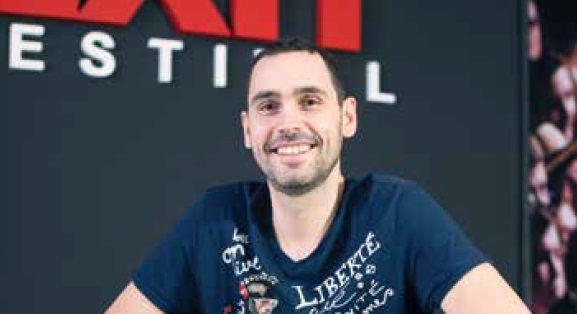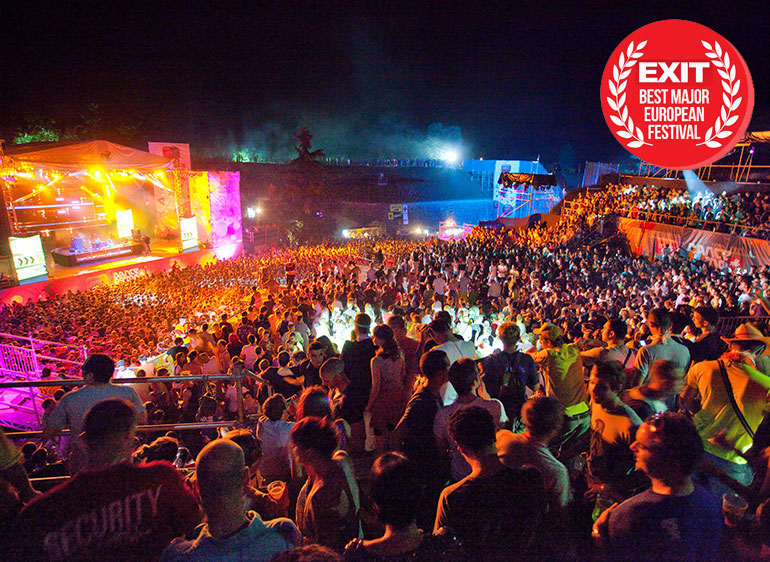PricewaterhouseCoopers stated that Serbia’s image was one of the key prerequisites for its economic
development. Hence, one of the most important goals of the EXIT Foundation is rebranding and improving
Serbia’s image in the world. We are talking to Dušan Kovačević, CEO of Exit Festival
EXIT does significantly contribute to branding of our country, be it through a direct financial revenue generated by
foreign tourists or through promoting the country itself. Personally, I think that promotion contributes more – says Dušan Kovačević, CEO of the EXIT Festival.
To what extent does the EXIT Festival contribute to the branding of our country and how important is the state’s support in this?
— The state’s support is necessary for the Festival to even exist considering the very limited sponsorship budgets in Serbia and the fact that the price of our tickets is several times lower than those charged by our European counterparts of similar size. I should mention that the financial support that we get from the state is returned to that very state through taxes and fees paid from the money we generate. It is also worth mentioning that the amount of
money that tourists from 60 countries spend here during the festival is at least 20 times bigger than the financial
support we receive from the government. I would also like to remind you that, according to the surveys conducted by the USAID and Serbian government, EXIT’s contribution to the Serbian economy currently stands between €10 and €15 million annually. Allow me to quote the publicist of the famous British magazine The Economist who said: “If Serbia spent the whole of its budget on PR, it wouldn’t do as much as EXIT and Novak Đoković have done for Serbia’s positive image in the world”. The journalist went on to call this promotion “priceless”. This is especially important not only for the country’s reputation but also for its overall development.
To what extent is the global financial crisis behind us if we use the number of expected guests, bands and singers you can afford, and ticket pricing policy as indicators?
— Unfortunately, the effects of the financial crises are not behind us although the situation is somewhat better compared to 3 or 5 years ago. The best indicators that the conditions are still not satisfactory are the sponsorship budgets which are several times smaller. The purchasing power of the Serbian audiences is also much lower than in the developed European countries. However, compared to previous years, we can notice that things have been
slightly improving. The most influential factor today is a growing number of festivals in Europe as a result of an increased demand for performers which lead to the price hikes with the fees that some performers charge having gone up by 1,000%. The festival business is an extremely competitive one. In spite of that, we have managed to survive regardless of charging 5 to 6 times less for the tickets than other big European festivals.
Can you compare your managerial skills in running this festival to managing a company and what specific skills do you need for this job?
— There are many similarities between business organisations and these extend to products, organisational sectors (like marketing, financial etc.) and other. What sets the EXIT Festival and other products of creative industries apart is the fact that the structure is less corporate than in regular companies. This is needed in order to achieve the maximum flexibility with the end goal of promoting innovation and creativity in the organisation. One of the idiosynchronicities of our organisation, which is also one of our biggest challenges, is the fact that our organisation
grows from several dozen employees to several thousand hired people from August to July. You cannot find such organisational stretch in regular companies and this creates several challenging processes, primarily in HR but also in other segments of the organisation.
How much emphasis was put on developing this “background segment” of EXIT as the festival matured and more popular bands and singers performed, and by “background” we mean running the camp and coordinating the entire festival with the work done by public service bodies?
— When we started staging this festival in Serbia, there was no specific know-how from which we could learn how to implement a project as complex as EXIT. We are talking about the infrastructure, technical production, hosting foreign performers, security for large-scale events (considering that the festival takes place at the fortress, a very
unique location for such event) and many other segments that didn’t even exist back then. We have been
developing and learning through our mistakes and trying different things. Today, EXIT is one of the best organised
events in Europe and our organisation has been fostering the development of dozens of professionals and companies from segments like technical production, infrastructure, security, video production, ticket sales, event marketing and many other which, today, are the leaders in their respective areas not only in Serbia and the Balkans, but in Europe
too. Many of them are holding lectures and educating future professionals in their respective industries all over Europe.
How important is your regional expansion considering that, thanks to the Sea Dance Festival, tourists are now staying longer in the region?
— Regional expansion is very important because development of tourism is one of the main opportunities for the development of the region. Youth tourism holds special importance since it is the main segment of the global tourist industry with a 25% share and an annual income of over €150 billion worldwide. The Balkan area has all the
human, natural and other resources for becoming one of the most attractive regions in the world. Modern-day tourists stay in one location between 3 and 5 days, as opposed to two weeks, and they want to visit as many different locations as possible during their vacation which usually lasts up to 3 weeks. To that end, regional expansion
and networking are the key and one of our most important goals is to position the Balkans as one of the leading youth tourism destinations in the world.


